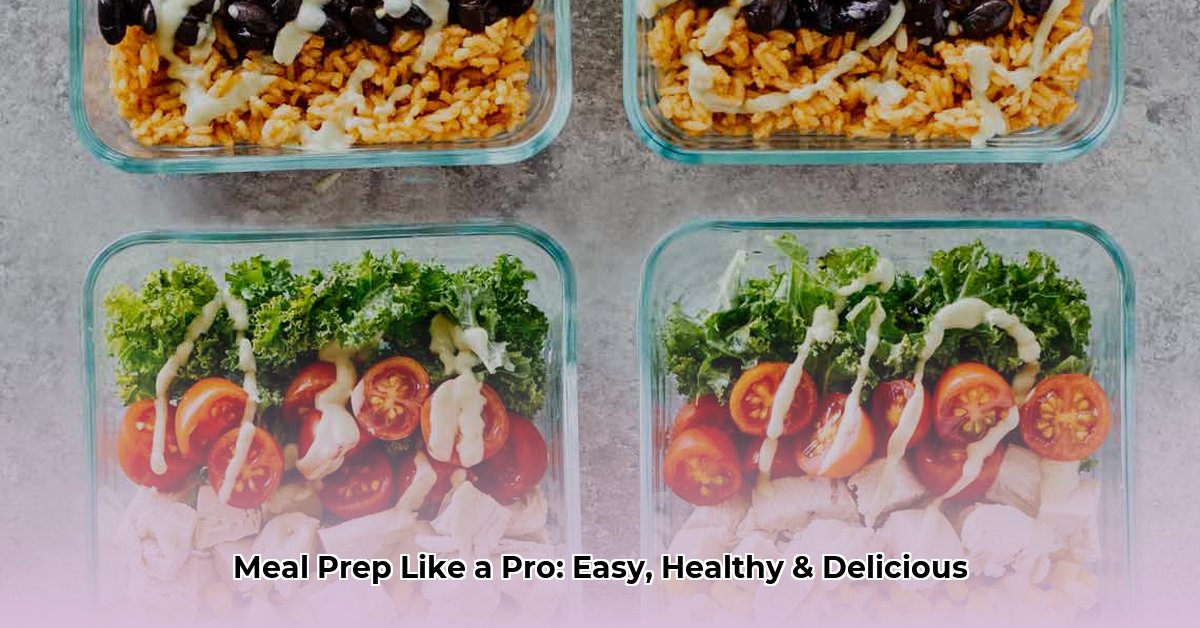Streamline Your Week: Meal Prep Strategies & Recipes
Ditch dinnertime chaos and embrace healthy, home-cooked meals with the power of meal prepping! This guide provides actionable tips, tricks, and delicious recipes to help you conquer mealtime, whether you’re a beginner or a seasoned pro. We’ll cover everything from planning and shopping to cooking, storing, and even addressing specific dietary needs. Say goodbye to weeknight stress and hello to a week of healthy, homemade meals!
Planning Your Meal Prep Attack
Before diving into the kitchen, a little planning can significantly streamline the process.
- Define Your “Why”: Identify your meal prepping goals. Are you aiming for weight loss, time-saving, or simply healthier eating? This helps stay motivated.
- Choose Your Style: Explore different meal prep approaches:
- Make-Ahead Meals: Fully prepared meals, ready to reheat. Convenient but potentially less flexible.
- Batch Cooking/Freezing: Cooking large batches and freezing portions. Ideal for stocking your freezer but requires space. Ongoing research suggests that slow cooking may better preserve some nutrients compared to other methods, but more studies are needed.
- Individual Portions: Prepped ingredients for individual meals, offering more variety but requiring some weeknight cooking.
- Prepped Ingredients: Pre-chopped veggies, cooked grains, marinated proteins – ready to be incorporated into various meals. Maximizes flexibility but requires culinary creativity. Current research suggests that some nutrients, like certain vitamins, may be more readily available after roasting vegetables.
- Menu Magic: Plan your meals based on dietary needs, preferences, and schedule. Consider themes (Meatless Monday, Taco Tuesday) to add excitement.
Smart Grocery Shopping
Think of your grocery list as a strategic battle plan.
- Prioritize Whole Foods: Load up on colorful vegetables, lean proteins (chicken, fish, tofu), and wholesome grains (quinoa, brown rice).
- Healthy Fats are Your Friends: Don’t forget avocados, nuts, seeds, and olive oil.
- Budget-Friendly Finds: Frozen fruits and vegetables offer excellent nutritional value at a lower cost.
Equip Your Kitchen Arsenal
While a state-of-the-art kitchen isn’t necessary, a few key tools can make a world of difference.
- Airtight Containers: Invest in a set of reusable containers in various sizes. Some studies suggest glass containers for reheating to minimize potential plastic leaching, although research is ongoing.
- Sharp Knives and Cutting Board: Essential for efficient chopping.
- Reliable Pots and Pans: A few versatile options will suffice.
Time-Saving Techniques
One of the biggest perks of meal prepping is saving time.
- Batch Cooking: Prepare large quantities of staples like grains, beans, or roasted vegetables on the weekend.
- Double Recipes: Whenever possible, double recipes to maximize your cooking efforts.
Meal Assembly: Building Your Culinary Masterpieces
With cooked ingredients ready, assembling meals can be surprisingly fast. Portion everything into containers and you’re done!
Breakfast: Fueling Your Day
- Overnight Oats: Combine oats, milk (dairy or non-dairy), chia seeds, and toppings in a jar the night before.
- Breakfast Burritos: Prepare a filling of scrambled eggs, veggies, and protein. Wrap in tortillas and refrigerate or freeze.
- Hard-boiled Eggs: A quick and easy protein-packed option.
Lunch: Conquering the Midday Slump
- Mason Jar Salads: Layer ingredients strategically to prevent sogginess. Start with dressing, then add sturdy vegetables, grains, protein, and finally, leafy greens.
- Quinoa Power Bowls: Combine cooked quinoa, roasted vegetables, lean protein, and a flavorful dressing.
Dinner: Simplifying Weeknight Meals
- Sheet Pan Dinners: Toss vegetables and protein onto a sheet pan, season, and roast. Minimal cleanup, maximum flavor. Some believe high-heat roasting may enhance nutrient bioavailability.
- Slow Cooker Meals: Add ingredients to your slow cooker in the morning and come home to a delicious, ready-to-eat dinner. Some experts think slow cooking can help preserve nutrients, although more research is needed.
- Casseroles: Prepare in advance and reheat during the week.
- Soups: A big batch can provide several days’ worth of meals.
Snack Smart
- Pre-portion snacks: Divide nuts, seeds, fruit, or Greek yogurt into individual containers for easy grab-and-go snacking.
Food Safety: Keeping it Fresh
- Refrigerate promptly: Store cooked foods within 3-4 days.
- Freeze for longer storage: Use airtight containers and label with dates.
Sample Meal Prep Plan (Vegan Adaptable)
This is a flexible template; adjust to your preferences and dietary needs.
| Day | Breakfast | Lunch | Dinner |
|---|---|---|---|
| Monday | Overnight Oats w/ Berries | Quinoa Salad w/ Roasted Veggies | Lentil Soup |
| Tuesday | Tofu Scramble | Leftover Lentil Soup | Chickpea Curry |
| Wednesday | Smoothie w/ Spinach & Fruit | Leftover Chickpea Curry | Black Bean Burgers |
| Thursday | Overnight Oats w/ Banana | Salad w/ Black Bean Burgers | Veggie Stir-fry |
| Friday | Toast w/ Avocado | Leftover Veggie Stir-fry | Pizza with Whole Wheat Crust |
Tips for Beginners: Meal Prep Mastery
Meal prepping is a journey, not a race. Start with these tips:
- Baby Steps: Begin with prepping a few meals for a couple of days.
- Keep it Simple: Choose easy recipes with minimal ingredients.
- Mise en Place: Prepare all ingredients before you start cooking.
By incorporating these strategies and recipes, you’ll transform mealtime from a source of stress into a week of delicious, healthy, home-cooked meals. Remember, the key is to find a routine that works for you and enjoy the process!
- Cooking Kits Make Mastering New Recipes Fun for Everyone - February 4, 2026
- Leak-Proof Glass Food Containers with Locking Lids Keep Food Fresh - February 3, 2026
- Glass Storage Containers With Glass Lids That Lock for Freshness - February 2, 2026










